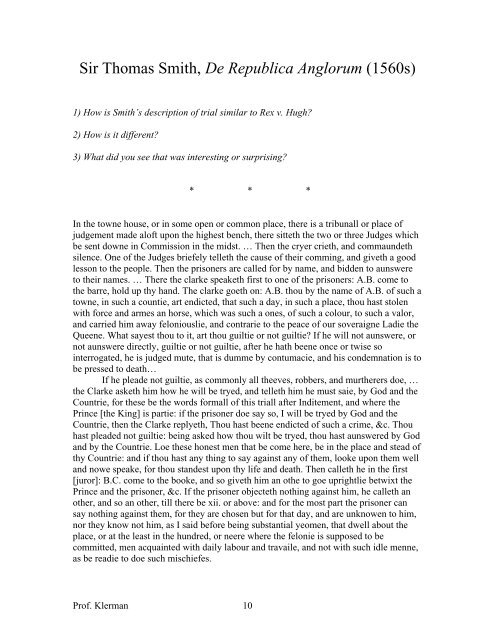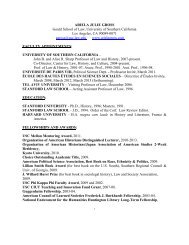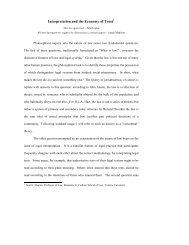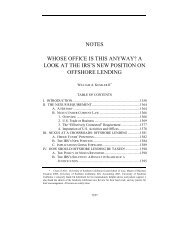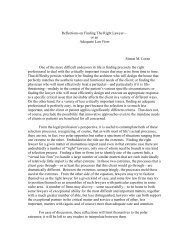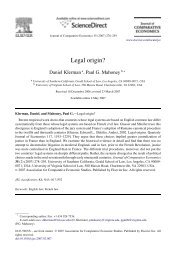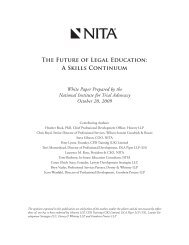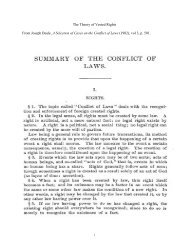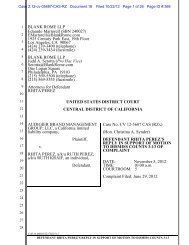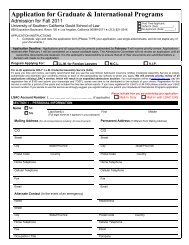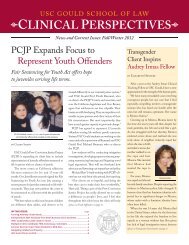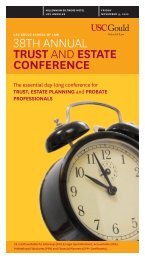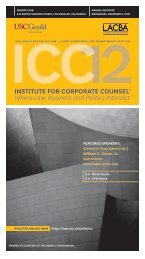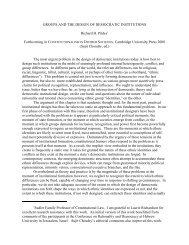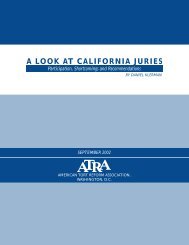Rex v. Hugh
Rex v. Hugh
Rex v. Hugh
You also want an ePaper? Increase the reach of your titles
YUMPU automatically turns print PDFs into web optimized ePapers that Google loves.
Sir Thomas Smith, De Republica Anglorum (1560s)<br />
1) How is Smith’s description of trial similar to <strong>Rex</strong> v. <strong>Hugh</strong>?<br />
2) How is it different?<br />
3) What did you see that was interesting or surprising?<br />
* * *<br />
In the towne house, or in some open or common place, there is a tribunall or place of<br />
judgement made aloft upon the highest bench, there sitteth the two or three Judges which<br />
be sent downe in Commission in the midst. … Then the cryer crieth, and commaundeth<br />
silence. One of the Judges briefely telleth the cause of their comming, and giveth a good<br />
lesson to the people. Then the prisoners are called for by name, and bidden to aunswere<br />
to their names. … There the clarke speaketh first to one of the prisoners: A.B. come to<br />
the barre, hold up thy hand. The clarke goeth on: A.B. thou by the name of A.B. of such a<br />
towne, in such a countie, art endicted, that such a day, in such a place, thou hast stolen<br />
with force and armes an horse, which was such a ones, of such a colour, to such a valor,<br />
and carried him away feloniouslie, and contrarie to the peace of our soveraigne Ladie the<br />
Queene. What sayest thou to it, art thou guiltie or not guiltie? If he will not aunswere, or<br />
not aunswere directly, guiltie or not guiltie, after he hath beene once or twise so<br />
interrogated, he is judged mute, that is dumme by contumacie, and his condemnation is to<br />
be pressed to death…<br />
If he pleade not guiltie, as commonly all theeves, robbers, and murtherers doe, …<br />
the Clarke asketh him how he will be tryed, and telleth him he must saie, by God and the<br />
Countrie, for these be the words formall of this triall after Inditement, and where the<br />
Prince [the King] is partie: if the prisoner doe say so, I will be tryed by God and the<br />
Countrie, then the Clarke replyeth, Thou hast beene endicted of such a crime, &c. Thou<br />
hast pleaded not guiltie: being asked how thou wilt be tryed, thou hast aunswered by God<br />
and by the Countrie. Loe these honest men that be come here, be in the place and stead of<br />
thy Countrie: and if thou hast any thing to say against any of them, looke upon them well<br />
and nowe speake, for thou standest upon thy life and death. Then calleth he in the first<br />
[juror]: B.C. come to the booke, and so giveth him an othe to goe uprightlie betwixt the<br />
Prince and the prisoner, &c. If the prisoner objecteth nothing against him, he calleth an<br />
other, and so an other, till there be xii. or above: and for the most part the prisoner can<br />
say nothing against them, for they are chosen but for that day, and are unknowen to him,<br />
nor they know not him, as I said before being substantial yeomen, that dwell about the<br />
place, or at the least in the hundred, or neere where the felonie is supposed to be<br />
committed, men acquainted with daily labour and travaile, and not with such idle menne,<br />
as be readie to doe such mischiefes.<br />
Prof. Klerman 10


